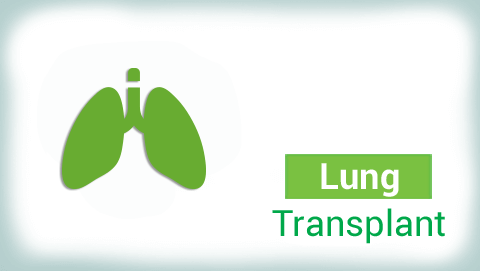Lung transplant is a complex surgery, and adequate nutrition plays a vital role in the healing process. Patients are required to make changes in their diet for a specific time-frame after lung transplantation. Patients’ diet is changed by the lung transplant team and dieticians to meet particular necessities and tolerances. After the transplant, patients need to make healthy food choices and avoid foods that can alter the effect of their medications, causing some side effects.
Importance of Nutrition in Lung Transplant
After the transplantation, the nutritional needs of the patient are high. As the patient has gone through a major surgical procedure, he or she will need balanced and quality nutrition that can help in the recovery process. To keep a check on the recovery process post lung transplant and to examine other health aspects, nutritional experts create a customized diet program, depending on the health analysis results, current weight, overall health condition, etc. Mentioned below are a few reasons why people need proper nutrition after a lung transplant:
- Vitamin-D and calcium are necessary for bone health.
- Vitamins, minerals, and proteins are essential to promote the recovery process.
- Calories are vital as the patient will be going through pulmonary rehabilitation.
Proper nutrition is also required for maintaining a healthy weight, regulating blood pressure and diabetes, and promoting overall good health.
The dietician and lung transplant team provide patients with all dietary plans and instructions that include a list of food to avoid and foods to have in their diet. For individuals, taking care of themselves or their loved ones post lung transplant is crucial yet overwhelming. It is wise to take the help of the lung transplant team and get proper guidance to promote healing and good health.
Foods to Avoid After Transplant
After a lung transplant, one must practice food safety and avoid certain foods that may intervene with medications or cause infections. As patients need to have immunosuppressant medications, they have to ensure that their diet is not susceptible to infections. Here are a few foods that one needs to avoid after lung transplantation:
- Raw or undercooked eggs
- Any fruit juice
- Raw seafood such as oysters, clams, sushi, etc.
- Unpasteurized milk and cheese
- Raw or undercooked meat or fish
Also, people need to avoid raw vegetables and fruits, especially for the first three months of surgery or till further instructions from the doctor.
Important Points to Keep in Mind
- You should keep cooked and raw foods separately.
- Eat only well-cooked seafood, meat, and poultry.
- When dining outside, avoid salad and undercooked or raw seafood or meat.
- Raw fruits and vegetables need to be washed properly.
Mindful Eating and How it Works
Mindful eating refers to maintaining an awareness of the food and drinks that a person consumes. Mindful eating is a skill one can achieve with practice. It is concerned with dieting, but with having foods with consciousness or mindfulness. In mindful eating, people need to practice eating by picking foods that can nourish the body and give a sense of satisfaction and fullness. People need to pay attention to the signal and sensations of the body and eat when they feel hungry, rather than just having food when they get emotional signals, such as boredom, loneliness, sadness, and stress. Mindful eating includes:
- Having food on time and being grateful for the food
- Avoiding distractions while eating (such as watching television or using a mobile)
- Paying attention to the body signals when they feel hungry
- Slow eating and chewing up the food properly
- Being attentive to the food (texture, colour, flavour, aroma, etc.)
- Selecting foods that are nourishing to the body
After a lung transplant, people are more susceptible to get an infection, high blood pressure, diabetes, weight gain, etc. Also, they are more prone to get mood swings. Mindful eating will allow people to have a gentler and kinder approach to eating. It will raise the awareness that food is vital not only for survival but for the proper nourishment of the body. It needs to be treated as a nutrient and medication for the body.
After transplantation, mindful eating helps people in the below-mentioned ways:
- Helps in weight management by healthy eating
- Limits/increases calorie intake (as recommended by the doctor)
- Helps make changes in unnecessary eating patterns and timings
- Controls food cravings and helps to deal with mood swings
- Helps regulate sugar level and blood pressure by avoiding or limiting certain foods
- Aids in decreasing side effects and unnecessary reactions by restricting food that can interfere with transplant medication
- Maintains a healthy lifestyle by promoting right and healthy eating, timely eating, and by following food safety rules
- Boosts digestion (helps avoid bloating and acidity) by encouraging slow eating and proper chewing
So, proper nutrition and a balanced diet are required after lung transplant for proper recovery and healthy life. There are some foods that one needs to avoid to reduce the side effects of anti-rejection medicines. By following a healthy diet plan and avoiding unsafe foods, people can protect themselves from all infections and live a long and healthy life. Mindful eating can be an effective way to help people achieve their health goals. A combination of good food and right eating habits is always the best way to live a healthy life.


